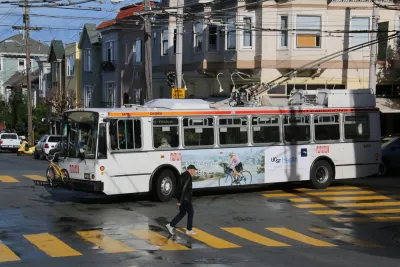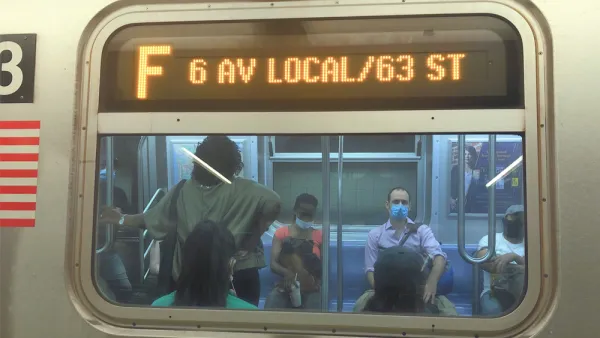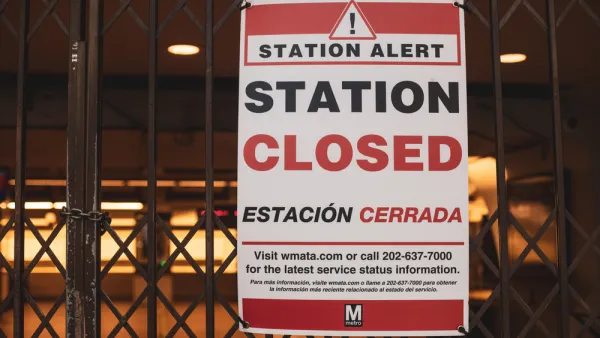Advocates have been waiting for the other shoe to drop as transit agencies deal with cratered revenues during the pandemic without support from Congress.

Carly Graf reports from San Francisco, where San Francisco Municipal Transportation Authority (SFMTA) officials recently released figures forecasting layoffs for as many as 1,226 full-time employees.
The layoffs would require SFMTA to reduce operations below the system's current 30 percent reduction in service during the pandemic.
Graf provides details on just how complete the fiscal crisis has become: "With farebox revenue still down by roughly 93 percent, parking revenue plateauing at roughly 50 percent of pre-pandemic levels and reductions to the agency’s General Fund contribution and sales tax revenues, funding through the traditional channels is unlikely to move the needle enough to close the gap."
SFMTA Director of Transportation Jeffrey Tumlin is quoted in the article issuing dire warnings and a bit of perspective, saying that the fiscal crisis is now far worse than the worst-case scenarios imagined at the beginning of the pandemic.
In Washington, D.C., Washington Metropolitan Area Transit Authority (WMATA) officials are detailing similar deep cuts to employment and service, piling on to news that first broke earlier in November. Jordan Pascale reports that the WMATA is now proposing that weekend service be eliminated entirely as that agency struggles to close a $500 million gap. "The plan also calls for trains to run every 30 minutes, shuttering 19 stations, further slashing bus service to a fraction of pre-pandemic levels and closing the system at 9 p.m," according Pascale.
New York City announced similarly massive layoffs and service reductions—a 40 percent reduction in weekday subway service and 9,000 layoffs—midway through November. Denver announced similar plans in September, as did the Maryland Department of Transportation.
News broke today about a potential $908 billion stimulus plan advancing in the U.S. Senate, though early reporting by Seung Min Kim, Jeff Stein, and Mike DeBonis on the news lacks details about how much of the package will be spent to rescue the nation's public transit agencies. The Riders Alliance, however, took to Twitter to oppose the bill as inadequate to the scale of the fiscal crisis facing transit in the United States. Jeff Stein also Tweeted a breakdown of spending included in the bill, with a document that identifies $45 billion for transportation, a figure that include airports, airlines, private bus companies, and Amtrak in its total, in addition to public transit.
FULL STORY: SFMTA prepares for massive potential layoffs as budget crisis continues to build

Analysis: Cybertruck Fatality Rate Far Exceeds That of Ford Pinto
The Tesla Cybertruck was recalled seven times last year.

National Parks Layoffs Will Cause Communities to Lose Billions
Thousands of essential park workers were laid off this week, just before the busy spring break season.

Retro-silient?: America’s First “Eco-burb,” The Woodlands Turns 50
A master-planned community north of Houston offers lessons on green infrastructure and resilient design, but falls short of its founder’s lofty affordability and walkability goals.

Test News Post 1
This is a summary

Analysis: Cybertruck Fatality Rate Far Exceeds That of Ford Pinto
The Tesla Cybertruck was recalled seven times last year.

Test News Headline 46
Test for the image on the front page.
Urban Design for Planners 1: Software Tools
This six-course series explores essential urban design concepts using open source software and equips planners with the tools they need to participate fully in the urban design process.
Planning for Universal Design
Learn the tools for implementing Universal Design in planning regulations.
EMC Planning Group, Inc.
Planetizen
Planetizen
Mpact (formerly Rail~Volution)
Great Falls Development Authority, Inc.
HUDs Office of Policy Development and Research
NYU Wagner Graduate School of Public Service



























